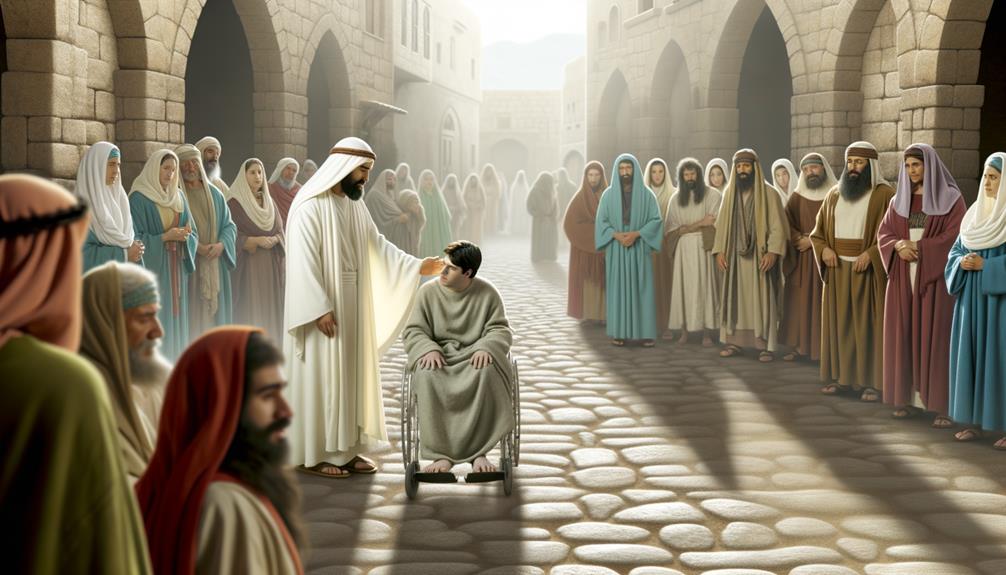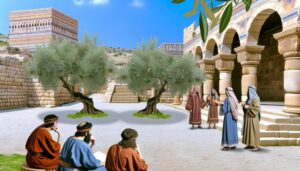Halt Meaning in the Bible: Divine Interruption
In the Bible, ‘halt’ primarily signifies physical lameness, as seen in Old scripture references like Leviticus 21:18 and the story of Jacob’s limp in Genesis 32:31, symbolizing deeper spiritual transformations. In the New scripture, ‘halt’ gains a richer meaning through Jesus’ healing miracles, symbolizing the holistic restoration of body and spirit (Matthew 15:30-31).
Beyond the literal, the term metaphorically represents critical spiritual junctures and divine interventions, prompting moral decision-making and introspection. Understanding these layers reveals the intricate relationship between physical ailment, spiritual wholeness, and divine engagement in biblical narratives.
Further exploration illuminates these nuanced interpretations.

Halt Meaning in the Bible: Symbolism of Decision, Weakness, and Divine Intervention
| Aspect | Biblical Interpretation |
|---|---|
| Literal Meaning | To stop or hesitate; also refers to lameness or physical weakness |
| Key Scripture | 1 Kings 18:21 – “How long halt ye between two opinions?” |
| Symbolism | Indecisiveness in faith or moral choices |
| Physical Usage | Describes the lame or those needing healing (Luke 14:21) |
| Spiritual Lesson | Call to make firm decisions in following God |
| Theological Insight | God strengthens the weak and calls the hesitant to faith |
Etymology of ‘Halt’

The term ‘halt’ in biblical usage originates from the Old English word ‘healtian,’ which means to limp or be lame, and is derived from the Proto-Germanic root ‘haltaz,’ denoting a state of physical impairment or discontinuation.
Etymologically, ‘halt’ conveys a sense of interruption or cessation, be it physical or metaphorical. This semantic lineage reflects a broader cultural and linguistic framework where physical conditions often mirror spiritual or moral states.
In theological discourse, understanding the origins and development of such terms is essential for interpreting scriptural texts accurately.
The evolution of ‘halt’ from a physical descriptor to a metaphorical term exemplifies the dynamic interplay between language and religious thought, providing deeper insights into biblical exegesis.
‘Halt’ in the Old Testament

In the Old Scriptures, ‘halt’ frequently appears as a term describing physical lameness, which often carries deeper symbolic implications. This term is particularly used in the context of Jacob’s encounter with the divine at Peniel (Genesis 32:31), where his physical limp signifies a transformative spiritual experience.
Similarly, in Leviticus 21:18, those who are ‘halt’ are excluded from priestly service, emphasizing ritual purity and wholeness.
The use of ‘halt’ extends beyond mere physical descriptions, often representing spiritual impediments or moral deficiencies.
Consequently, in the theological landscape of the Old Covenant, ‘halt’ serves as a multifaceted metaphor, intertwining physical conditions with deeper spiritual and ethical dimensions, offering a rich area for exegetical and hermeneutical exploration.
‘Halt’ in the New Testament

Building on the Old Covenant’s multifaceted metaphorical use of ‘halt’, the New Covenant recontextualizes the term within the framework of Jesus’ healing ministry and the emerging Christian understanding of wholeness and redemption.
In the New Scripture, ‘halt’ often signifies physical impairments, as seen when Jesus heals the lame (Matthew 15:30-31, Luke 14:21). This act of healing transcends mere physical restoration; it symbolizes the advent of the Messianic age and the in-breaking of God’s Kingdom.
Additionally, the term embodies the theological vision of holistic salvation—encompassing spiritual, emotional, and communal restoration. Consequently, ‘halt’ in the New Scripture is both a literal and symbolic conduit for conveying the transformative power of Christ’s redemptive work.
Literal Meanings of ‘Halt’

The literal meanings of ‘halt‘ in the Biblical context encompass both physical cessation of movement and metaphorical pauses in spiritual journeys.
Analyzing scriptural instances, it becomes evident that ‘halt’ is used to signify important moments of reflection and decision-making.
This duality in meaning invites a deeper theological exploration of how physical stopping points and scriptural interpretations intertwine to convey broader spiritual truths.
Physical Stopping Points
Biblical texts often utilize the term ‘halt‘ to signify explicit instances where physical movement or progress is abruptly interrupted.
For instance, in the Old Scripture, the Israelites’ journey through the wilderness often encountered halts, such as when they encamped at specific locations as directed by divine command (Numbers 9:17-23).
Similarly, in the New Scripture, Jesus’ healing miracles sometimes involved halting physical ailments, as seen with the man at the pool of Bethesda who was made to ‘walk’ after being ‘halt’ (John 5:8-9).
These occurrences underscore the importance of physical stopping points in the narrative, highlighting moments of divine intervention and human obedience.
The literal halts serve as tangible markers of God’s guidance and miraculous power.
Scriptural Interpretations Explained
Examining the literal meanings of ‘halt’ in scriptural contexts reveals a multifaceted concept that extends beyond mere physical cessation to encompass symbolic and spiritual dimensions. The term ‘halt’ in the Bible often signifies more than a simple stop; it embodies deeper theological implications:
- Physical Impairment: In various passages, ‘halt’ denotes physical lameness or disability, illustrating human frailty and dependence on divine intervention.
- Decision Point: It signifies a moment of essential decision-making, urging believers to choose between paths of righteousness and sin.
- Divine Intervention: ‘Halt’ can also indicate a deliberate pause orchestrated by God to provoke reflection, repentance, or renewal.
Thus, understanding ‘halt’ requires an extensive examination of its physical, moral, and divine dimensions within scriptural narratives.
Metaphorical Uses of ‘Halt’

The metaphorical uses of ‘halt’ in biblical texts often signify critical junctures in spiritual transformation, where divine interventions prompt a reassessment of one’s path.
These moments serve as moral decision points, compelling individuals to confront ethical dilemmas and make choices aligned with divine will.
Consequently, ‘halt’ in a metaphorical sense encapsulates both the interruption of a current trajectory and the potential for profound spiritual renewal.
Spiritual Transformation Journey
In the context of a spiritual transformation journey, the term ‘halt’ is often employed metaphorically to signify moments of introspection and divine intervention that prompt significant shifts in one’s spiritual path.
These metaphorical ‘halts’ serve as critical junctures where individuals pause to reassess their beliefs and behaviors, often leading to profound spiritual growth.
Such moments can manifest in various forms:
- Periods of Crisis: When faced with personal or existential crises, individuals may halt to seek deeper understanding and connection with the divine.
- Revelatory Experiences: Sudden insights or epiphanies can cause one to halt and reevaluate their spiritual direction.
These halts are essential for fostering spiritual maturity and transformation.
Divine Interventions Explained
Divine interventions, often symbolized by the metaphorical ‘halt,’ serve as pivotal moments orchestrated by the divine to redirect and realign an individual’s spiritual journey. These interventions are not arbitrary but are purposefully designed to arrest the momentum of one’s current path, allowing for reflection and transformation.
Scriptural accounts, such as Paul’s encounter on the road to Damascus, exemplify how divine halts precipitate profound spiritual awakenings and redirections. Theologically, these moments underscore the sovereignty of the divine in guiding believers towards a deeper, more authentic relationship with God.
The ‘halt’ consequently becomes a sacred pause, a divine invitation to reassess one’s life, renew faith, and embrace a divinely ordained trajectory. This understanding enriches the believer’s comprehension of divine purpose and intervention.
Moral Decision Points
Exploring the metaphorical use of ‘halt’ within moral decision points reveals how these pivotal moments serve as critical junctures where individuals must confront ethical dilemmas and make choices that align with their spiritual convictions.
Such halts are essential for:
- Reflection: Pausing to evaluate one’s actions in light of biblical principles.
- Repentance: Recognizing moral failings and seeking divine forgiveness.
These metaphorical halts underscore the necessity for believers to engage in introspection and realignment with their faith.
They serve as divine invitations to reassess one’s journey, ensuring that choices are made with a conscientious adherence to scriptural mandates, thereby fostering spiritual growth and moral integrity.
‘Halt’ and Physical Lameness

The term ‘halt’ in biblical texts frequently denotes physical lameness, reflecting both literal and metaphorical dimensions of human infirmity. This dual representation underscores the broader theological narrative of human vulnerability and divine intervention.
In several passages, those who are ‘halt’ are depicted as recipients of miraculous healings, showcasing God’s compassion and power. The term’s usage also serves as a poignant metaphor for spiritual and moral shortcomings, which are redeemed through faith and divine grace.
| Biblical Reference | Description |
|---|---|
| Matthew 15:30 | Lame brought to Jesus for healing |
| Luke 14:21 | Parable invitation to the lame |
| John 5:3 | Lame at the Pool of Bethesda |
| Acts 3:2 | Lame man healed by Peter and John |
This multifaceted interpretation invites deeper reflection on the interplay between physical ailment and spiritual restoration.
‘Halt’ and Spiritual Indecision

Beyond its association with physical lameness, the term ‘halt’ in biblical contexts also metaphorically signifies spiritual indecision, highlighting moments of wavering faith and moral ambivalence.
This metaphorical usage underscores the internal struggles faced by individuals and communities in their spiritual journeys. Examples of such indecision include:
- Elijah’s confrontation on Mount Carmel: where the prophet challenges the Israelites to cease halting between two opinions (1 Kings 18:21).
- The journey of the Israelites in the wilderness: reflecting their recurrent vacillation between faith in God and doubt (Exodus 16:3).
These instances illustrate the profound theological implications of ‘halt’ as a metaphor for spiritual uncertainty.
Divine Intervention and ‘Halt’

In moments of spiritual hesitation and moral ambivalence, divine intervention often serves as a decisive force that compels individuals and communities to overcome their wavering faith.
The concept of ‘halt’ in the Bible frequently intersects with instances of divine intervention, where God’s actions instigate a pause in human activity to realign moral compass and purpose.
This divine ‘halt’ is not merely a cessation but a transformative moment, prompting introspection and spiritual recalibration.
For example, in the Exodus narrative, the plagues in Egypt serve as divine interruptions, halting Pharaoh’s oppressive regime and guiding the Israelites toward liberation.
Such interventions underscore the theological principle that divine authority can decisively resolve human uncertainty, fostering spiritual clarity and renewed commitment to divine will.
‘Halt’ in Biblical Narratives

In Biblical narratives, the concept of ‘halt’ frequently emerges both as a potent symbol and as a direct command from the divine.
Symbolically, ‘halt’ often signifies moments of profound change or decision, underscoring the gravity of divine interaction in human affairs.
Additionally, ‘halt’ serves as a divine directive, compelling individuals or nations to pause and reconsider their actions in light of God’s broader plan.
Symbolic Interpretations of ‘Halt’
The term ‘halt’ in biblical narratives often symbolizes a moment of divine intervention or a vital point of decision-making within the spiritual journey of the characters.
These instances serve as pivotal junctures that can alter the trajectory of faith and obedience. Symbolically, ‘halt’ can encapsulate:
- Divine Encounter: Moments when God directly intervenes in human affairs, compelling a pause.
- Moral Decision: Critical points where individuals must choose between righteousness and sin.
These symbolic interpretations underscore the theological significance of ‘halt’ as more than a physical stop, reflecting deeper spiritual themes central to the biblical narrative.
Understanding these layers enriches one’s comprehension of the text’s spiritual import.
‘Halt’ as Divine Directive
Biblical narratives frequently depict ‘halt‘ as a divine directive, where God commands a cessation of action to impart instruction, judgment, or revelation.
For instance, in Exodus 14:13-14, Moses instructs the Israelites to ‘stand firm’ and witness God’s salvation, highlighting ‘halt’ as a moment of divine intervention.
Similarly, in Acts 9:3-4, Saul’s journey is abruptly halted by a divine vision, redirecting his path towards apostleship.
These instances underscore ‘halt’ as not merely a pause but as a profound moment of divine engagement.
The theological implication is that halting can signify a transformative encounter with the divine, where human actions are suspended to acknowledge God’s sovereignty and purpose.
This divine halt often serves to redirect, instruct, or reveal deeper truths.
Lessons From ‘Halt

Understanding the term ‘halt’ within its biblical context provides profound theological insights into the nature of divine intervention and human obedience. The term serves as a divine imperative, compelling individuals to pause and reflect upon God’s will.
Lessons drawn from ‘halt’ include:
- Divine Sovereignty: God’s command to halt underscores His ultimate authority over human affairs, reminding believers of His omnipotence.
- Human Obedience: The act of halting is a test of faith, requiring individuals to submit to divine guidance even when the path ahead seems unclear.
These lessons emphasize the intricate relationship between divine command and human response.
Conclusion
In the grand tapestry of biblical teachings, ‘halt’ emerges as both a literal impediment and a metaphorical crossroads.
It signifies moments of physical pause and spiritual indecision, reflecting divine intervention. The term serves as a beacon, guiding the faithful through the labyrinth of life’s challenges.
By understanding ‘halt’ in its multifaceted contexts, one gains deeper insights into the divine narrative, reminding believers of the omnipresent guidance that lights their path.






